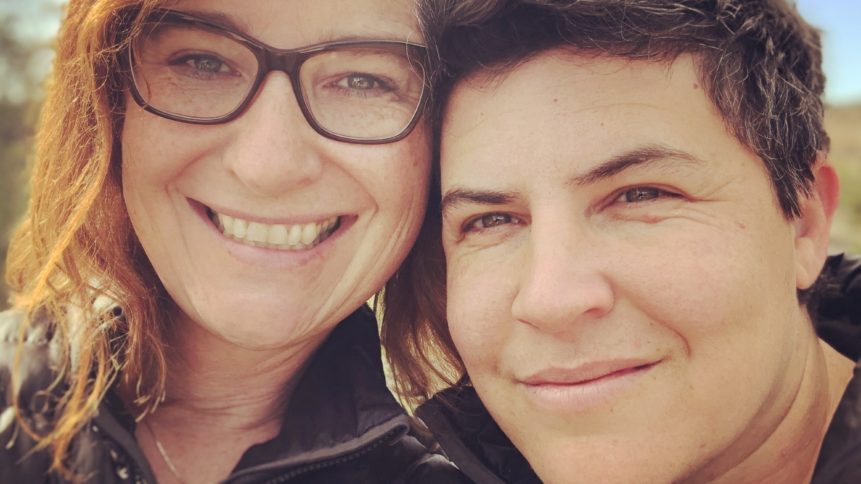
When Ethan and Allie married each other 11 years ago, they were not who they are now. (Both literally and figuratively!) They started their relationship when Allie was a man and Ethan was a woman. Allie had biological children from her last relationship, and the couple knew that one day they wanted to start a family together. At the time, they never imagined they’d transition (Allie from male to female and Ethan from female to male), and that they’d have to undergo multiple fertility treatments in order to try to have children together.
Here’s their growing family story:
Q: When did you decide you wanted to start a family together?
Ethan: I always knew I wanted kids with Allie, even as we were co-parenting her two biological children from her previous marriage. They were 4 and 6 when we got together. So I missed the diaper stage, but got most of the other stages. When Allie was about to transition genders we started thinking more seriously about having kids of our own and the fertility ramifications of Allie going on hormones. That was about 4 years ago now.
Allie: As Ethan said, we’ve known each other over a decade now. While we did began our relationship with my two children from a previous marriage living with us part time, very early on we discussed having our own children. So, almost as long as we’ve known each other, we’ve known that we want to have children together.
Q: How would you summarize the last few years in terms of transition?
Ethan: Transition is difficult and expensive. We have both been rebuilding ourselves from the ground up. It’s a strip-it-back to the foundation, laborious and emotionally draining process. Thankfully we’ve given each other a lot of grace and compassion. And, we are so very lucky that it wasn’t worse for us.
Allison is the CEO of a tech company she founded, and her investors and teammates have been amazingly supportive. I work as a lobbyist, and in Nevada we have a majority of democratic legislators, and everyone on both sides of the aisle has been very supportive of my transition. So, thankfully, we have been able to keep our jobs and haven’t experienced very much workplace discrimination.
Allie: How to summarize gender transition, it’s so very pervasive—I think that’s the word I’m looking for. First, let’s talk internal, and then touch on external.
Internally, the best way I can describe it is to consider what it might feel like to rediscover a majority of how you’ve known yourself for your entire life. Consider you know yourself pretty well—what you like and don’t like, what you’re good at and not so good at, how your moods typically are, the types of friends you enjoy. The whole thing. Now, imagine a large evolution in all of those things that you knew about yourself. I call it a “rediscovery”, because for me at least, it wasn’t like a completely new aspect of a part of my life, but more a refinement or adjustment. So, it can be very scary, because you may re-learn about parts of yourself that you aren’t used to. And, that can cut to the very root of what identity means.
Now consider the external side. Imagine every single relationship you currently have. Now consider that every single one of those relationships could cease to exist once you declare that you are indeed transgender. That can be debilitating for people, and nearly was for me. I was incredibly lucky in that Ethan supported me, along with my children, most family, and much of my professional life—that’s unusual, and I’m very grateful for that. Not everyone has this experience.
Lastly, I had the wonderful experience of watching Ethan begin his transitional journey after I was well through my own transition. What a strange and amazing experience! Initially I thought it’d be super easy—I know what it’s like, I can be a good support for him. But, it’s difficult in its own way, seeing someone you’ve known for so long not only change significantly, but struggle through the same difficulties I had just experienced a few years before. I can tell you, it looks different from the non-transitioning spouse perspective than it does from the transitioning spouse’s perspective – even when I had gone through it already. But, it also gave me the rare opportunity to connect to Ethan on such an incredibly deep level—knowing what he’s experienced in both roles. It’s added such a beautiful dimension to our relationship.
Q: What did you each decide to do to preserve your fertility before starting other hormones?
Ethan: I was sort of a late bloomer. I came out to Allie as transgender (female to male) two years after she came out. At that point we decided to try a few rounds of IUI before I transitioned. That was last April. We had 4 failed IUIs and had to move to IVF because we were running out of vials of sperm. IUI required millions of sperm, whereas IVF only requires one good one to fertilize the egg. We then went through three cycles of IVF (egg retrieval) and one failed frozen transfer before we decided I needed to get on Testosterone for my own mental health and start transitioning. That’s where we area now.
We were able to freeze two healthy embryos that we hope to transfer next Fall after I am on testosterone for a while and carrying on with my gender transition.
Allie: As Ethan can attest to, I tend to be a planner. So, after I had come out to Ethan and began talking about a transition plan and timelines, one of the first topics I wanted to ensure was to bank enough specimen so that we could have our own children one day. I knew from researching male-to-female transition that the hormones I would begin taking would sterilize me. On top of that, I had undergone a vasectomy about 15 years prior, so my body had already been producing much less sperm than it used to. So we knew my sperm count and motility would probably be pretty poor.
So the plan was, get a vasectomy reversal, wait six months to heal and begin reproducing sperm, then begin banking as much as possible before starting hormones. Mind you, writing this out makes it sound so easy—just do these things and then start HRT (hormone replacement therapy)! The problem is, every day longer that you wait, the harder the gender dysphoria gets. So there comes a point where you decide that you’ve done enough, you’ll need to trust the universe to do what it will do, and you begin HRT (hormone replacement therapy), so that you don’t get crushed under the depression and malaise. This is also the reason why it’s so dangerous and cruel that some rudimentary medical professionals insist on trans people waiting a certain number of months or years before prescribing HRT. Gender dysphoria, for me at least, gets worse over time. It is not static.
We then went through three cycles of IVF (egg retrieval) and one failed frozen transfer before we decided I needed to get on Testosterone for my own mental health and start transitioning.
Q: What has surprised you about fertility treatments or the process of trying to create embryos?
Ethan: There were a few things that surprised me…
1. I only heard about people who got pregnant on their first IVF cycle. So, we didn’t plan for doing three + cycles. I also just thought that we would be the exception, not the rule and would get it on the first try since I had zero known fertility issues. I couldn’t have been more wrong.
2. They don’t really give you much to go off of. How little they tell you throughout the process. The clinic gave us a big notebook that explained everything, but in “real time” we didn’t get a lot of explanations. The visits and procedures were pretty cut-and-dry. And, there wasn’t a lot of explanations for anything.
Allie: I assumed that getting pregnant was going to be pretty easy, mostly because neither of us had any known fertility issues (other than my vasectomy prior). Though my motility was a little low, my sperm count was reasonable and within expected values for the IUI procedure. But after four tries of IUI with nothing happening, we thought, ok, IVF we’ll have no problem with—it’s all science! Three tries later and still not pregnant, it became clear that this is not going to be an easy process.
There were many things I didn’t know initially about the beauty and capability of our bodies, and had to learn through the Internet or through other trans people. For instance, trans women, though born without a uterus, can often induce lactation and breastfeed their babies, even if they didn’t give birth to them.
Q: What do you wish people understood about the experience of modern family-building from a trans perspective?
Ethan: Well, first off if we had both known that we were trans earlier, we probably would have started building our family earlier or at the very least researching it. The evidence is pretty clear that fertility drops off significantly after age 35. Every month counts after that point. Also, we need more information on the web about how to build a trans family. There is starting to be a lot more medical practitioners interested in the trans fertility experience, which means more education is happening, but there is a ton of room for improvement. Many folks are learning about trans family building through Reddit and Facebook groups. I really appreciate the work they are doing at UCSF, especially Dr. Juno Obedin-Maliver, who co-wrote a fantastic white paper on Transgender Men and Pregnancy that has added to the scholarship around trans fertility.
Allie: There were many things I didn’t know initially about the beauty and capability of our bodies, and had to learn through the Internet or through other trans people. For instance, trans women, though born without a uterus, can often induce lactation and breastfeed their babies, even if they didn’t give birth to them. Motherhood is a difficult thing to battle with as a trans woman, because today there is no known medical procedure to allow trans women to bear children. But, even small things like breastfeeding allows women of all types to bond with their children, even if they are unable to carry the child themselves, whether they’re trans or not.
And, I second that freezing eggs or sperm as early as possible is so very important for people battling gender dysphoria. The issue being that nobody—including the person with the dysphoria—knows how much worse it will get over time. So to put it off and assume you can take care of it later is a dangerous bet. You don’t want to spend years like we both did trying to prep your reproductive parts because it wasn’t convenient earlier.
If we had both known that we were trans earlier, we probably would have started building our family earlier or at the very least researching it. The evidence is pretty clear that fertility drops off significantly after age 35. Also, we need more info on the web about how to build a trans family.
Q: What should healthcare providers know with respect to transgender people undergoing treatments?
Ethan: Pronouns, pronouns, pronouns. Always ask what the patient’s preferred pronouns are and make sure everyone in the clinic knows to use those pronouns—all the time. Also, that cis women are not the only people who get pregnant.
Allie: I couldn’t agree more. Pronouns matter more than many imagine. Every time it’s misused, it’s invalidating the constant dysphoric barrage trans people deal with on a daily basis. It may seem strange at first to people, but healthcare providers are a very adaptive group. The effort matters.
Ethan and Allie are continuing to pursue reproductive treatments to build their family together and want other transgender people to know that there is support and options for them, even if these things are not always apparent.

Listen to stories, share your own, and get feedback from the community.


















